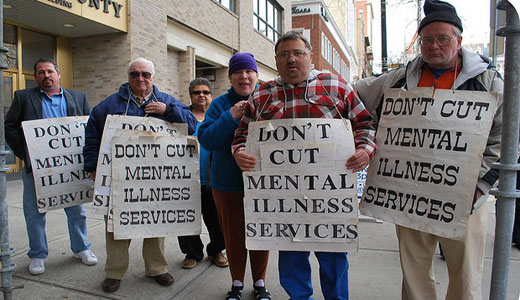
I recently had to live through the experience of a mental health crisis. It interrupted my studies as a social work student, and caused changes in the way I live my life. And it brought me into contact with one of the most broken, ill-equipped social safety nets in the United States.
Mental health issues have been highlighted throughout the news media following the recent mass shootings in Colorado, Arizona, and Connecticut. The system is chronically underfunded, and there are shortages of both services and qualified mental health workers to handle the caseloads. We in America have a large-scale mental health crisis on our hands. Here I want to highlight my own struggle within the system before I was finally able to secure treatment and services that stabilized my condition.
What is mental illness? It is simply a “mind disability.” It can come in many forms, such as depression, schizophrenia, or a personality disorder.
I used to work in direct support with individuals with intellectual disabilities and mental illness. I had no idea I would eventually fall into the same category. I’m diagnosed with what’s known as severe clinical depression. I knew something wasn’t right when I began to lose interest in a lot of the things I used to enjoy. I stopped reading books and writing. I stopped studying in school. I was sleeping for most of the day. I would have spells of crying that would last for hours on end.
Eventually it got so bad I started thinking about suicide. That’s when I knew I had to get help. First I went to my local hospital emergency room after I found out they offered psychiatric services. This began a week-long battle to even get initial treatment. I’m on my parents’ health insurance plan. There’s no mental health parity for privately purchased insurance policies. My parents’ insurance wouldn’t even cover my hospital stay.
However I was in luck: by law hospitals have to treat you if you walk into an emergency room in an emergency including mental health situations. I was admitted and spent a week in the hospital, where I was given antidepressants and took part in therapy. Although this inpatient admission was helpful it was only what is known as “crisis stabilization.” That means that hospitals only need to stabilize your situation, then you have to be discharged.
Upon discharge I was faced with the daunting task of connecting myself to the complex and expensive web of services that make up the mental health system. I had to apply for Medicaid and SSI – Supplemental Security Income – because I did not qualify for regular Social Security. Medicaid is the main insurer for mental health because many private insurance plans won’t offer mental health services. I had to fight to find a psychiatrist and counselor who even took Medicaid.
I also had to find case management. Case managers are social workers who work with people with mental health and behavioral problems. The problem is it’s a for-profit business. Government agencies contract out case management to for-profit companies who hire too few case managers, for low wages, few or no benefits, and long hours.
The average case manager has several dozen “consumers” (the mental health term for client), all of whom he or she must be responsible for without any help. The turnover rate is high and I’ve gone through seven different case managers in a one-year period. They’re supposed to help connect you to community resources and social services as well as employment training. However because I’ve had seven case managers, I haven’t been able to get any kind of job training or community resources. Unions are surely needed for mental health workers, who go above and beyond the call of duty.
Mental health “consumers” are on waiting lists for services. They’re homeless in the streets. There’s a lack of housing. Stigma and fear of violence prevent the mentally ill from getting access to jobs or education. The fact is, most mentally ill people aren’t violent. These are real, ordinary people we’re talking about. I had to fight to get the services I have today. And even though I’m stable now, and getting the treatment I need, other people aren’t so lucky.
The system is broken. It’s especially shocking in the aftermath of all the recent mass shootings. We need real mental health reform along with national health care. I am living proof of that.
Photo: A rally protests proposed cuts in county mental health services, Albany, N.Y., Nov. 12, 2009. PilotGirl CC 2.0












Comments